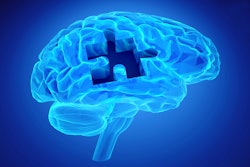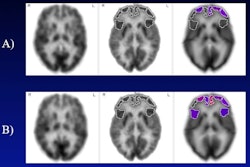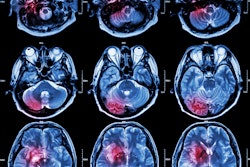MRI has shown that hearing loss may increase dementia risk in seniors not yet cognitively impaired in ways distinct from those that tend to be associated with conditions such as Alzheimer's and cerebrovascular disease.
A team led by Thomas Parker, MD, of the Imperial College London in the U.K. found that, compared with older adults who did not have hearing impairment, those who did had faster rates of whole brain atrophy. The findings were published April 3 in the Journal of Neurology, Neurosurgery and Psychiatry.
"Our data suggest a complex interplay of hearing ability, neurodegeneration, and cognition and implicate pathways separate to those typically implicated in Alzheimer’s and cerebrovascular disease," the team noted.
Previous research has suggested that hearing loss is a modifiable risk factor for dementia, Parker and colleagues explained. But the link between hearing, neurodegeneration, and cognitive change remains unclear. Parker's team sought to address this knowledge gap by conducting a study that included information from 287 adults born in the same week of 1946 who underwent baseline pure tone audiometry and cognitive assessment/multimodal brain MRI exams at two different time points. The group defined hearing impairment at baseline as a pure tone average of greater than 25 decibels in the best hearing ear; estimated rates of change for whole brain, hippocampal, and ventricle volume from the MRI exams; and assessed study participants' cognition using the Pre-clinical Alzheimer's Cognitive Composite tool.
Of the 287 participants, 111 had hearing impairment. The authors found that, compared with those who did not have hearing impairment, those who did had faster rates of whole-brain atrophy (p = 0.031). It also found that worse hearing (that is, higher pure tone average) predicted faster rates of hippocampal atrophy and that faster rates of whole brain atrophy translated to greater cognitive changes (p = 0.004). Both these results remained after the team adjusted for adjustment for amyloid beta status and white matter hyperintensity volume, the team wrote.
"[Peripheral] hearing impairment predicts faster rates of brain atrophy in older adults," it noted. "This is consistent with previous reports, but extends these findings to show these effects are independent of [amyloid beta]-status and [white matter hyperintensity volume], suggesting that relationships between hearing loss and neurodegeneration may be driven by mechanisms other than Alzheimer's or cerebrovascular disease."
Hearing loss imparts cognitive burden – especially on brain processes that require language comprehension – and this phenomenon could cause "cognitive dysfunction to become manifest, in situations where brain reserve is already limited," the group suggested. It concluded the study by calling for more research.
"Future work examining the precise mechanisms that predict cognitive change in the context of hearing impairment are required," the authors wrote. "In particular, investigating to what extent auditory impairment is a risk factor for, or manifestation of, neurodegenerative processes, and whether these can be mitigated by appropriate hearing interventions."
The complete study can be found here.




















